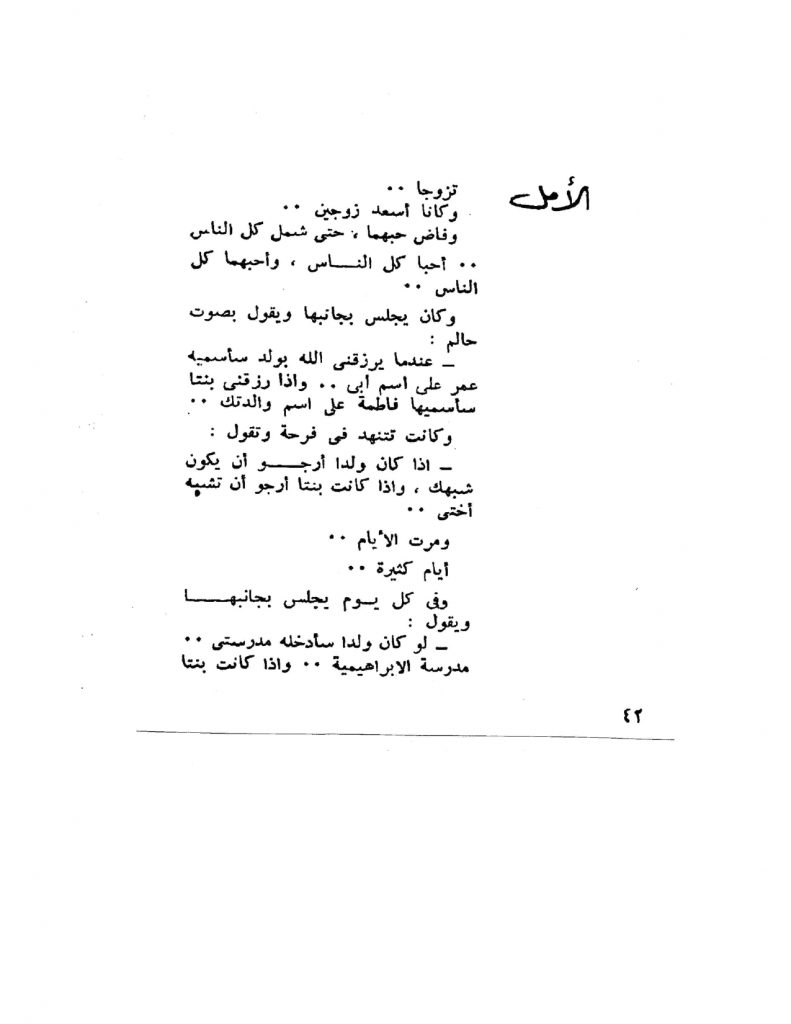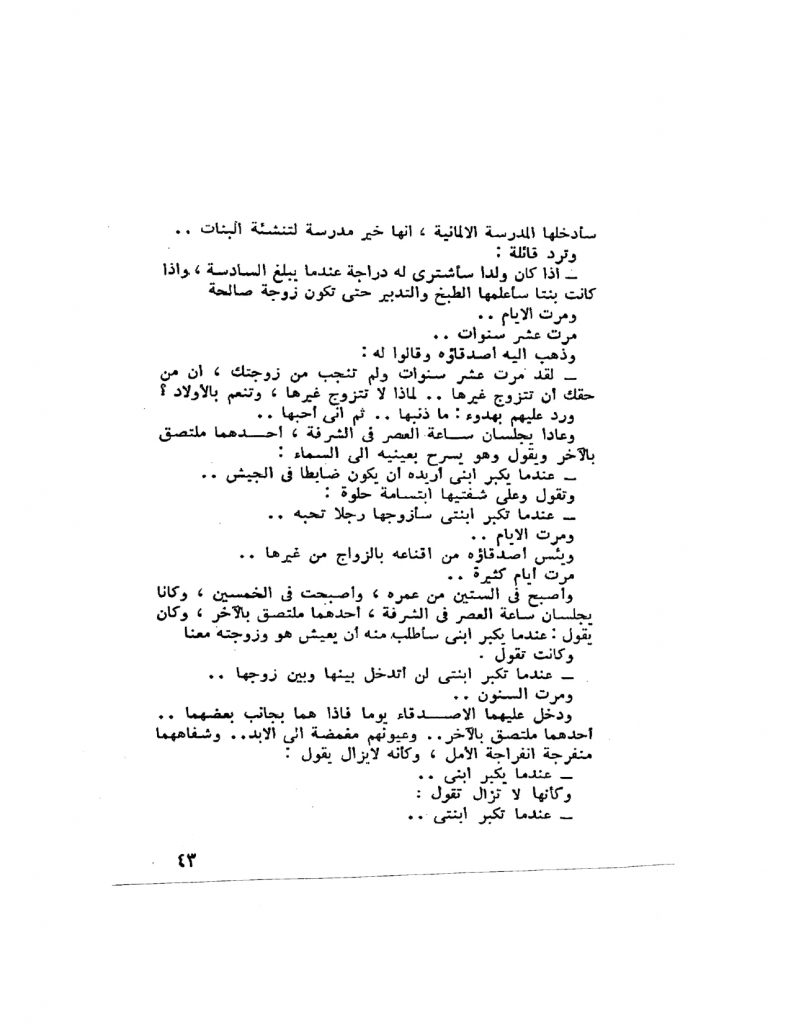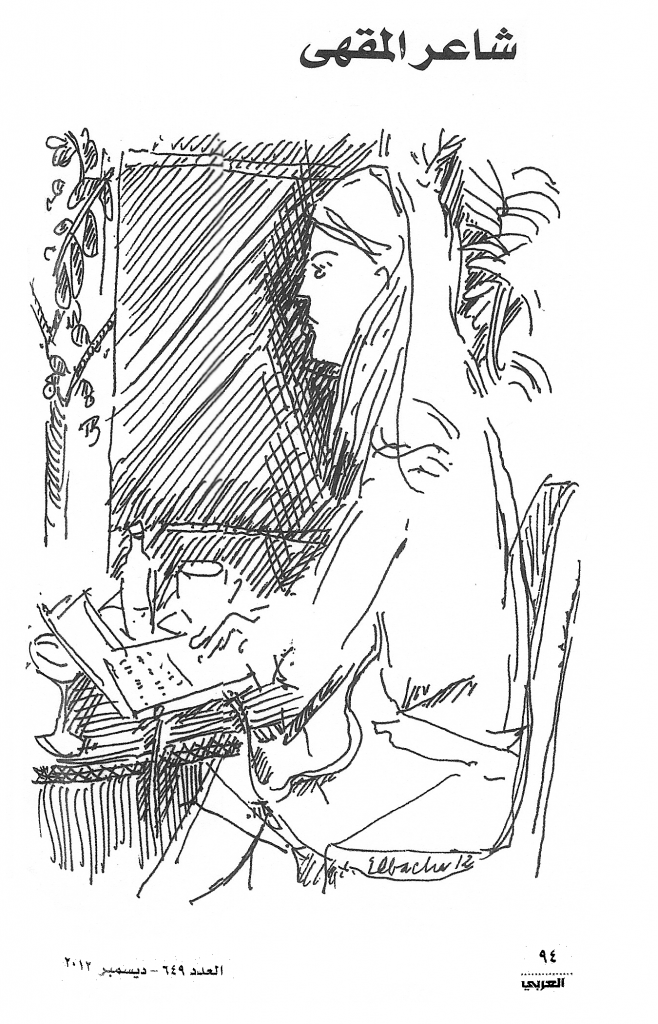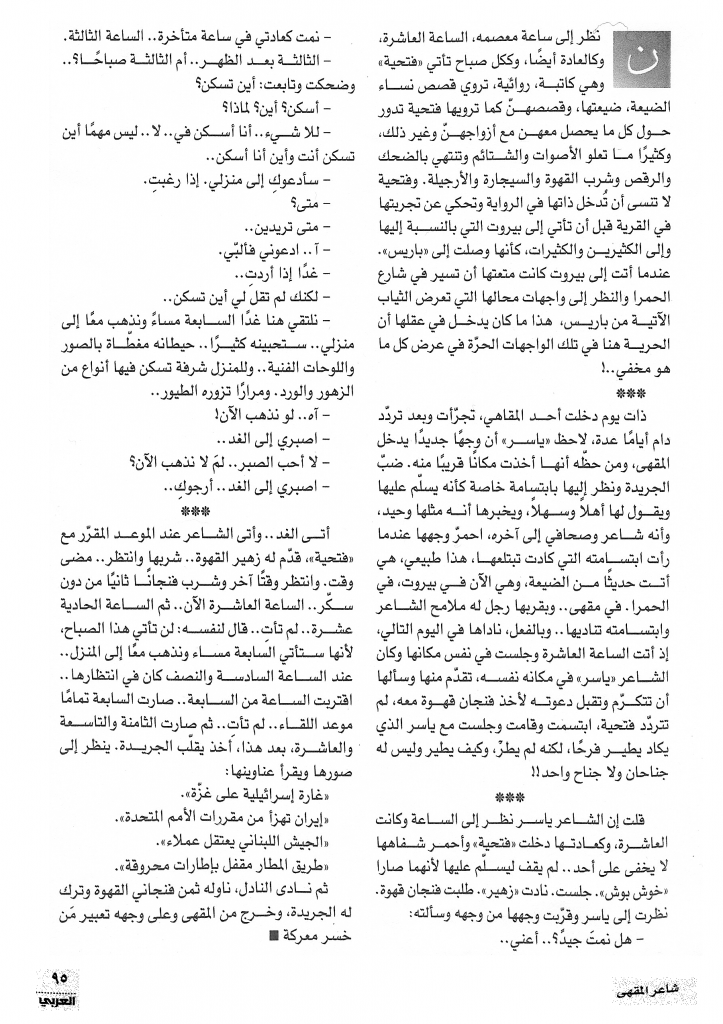



1. الحال
A number of examples occur in this lesson as they frequently do in narratives of the construction referred to as الحال. We will examine first their structure, then their meaning, and then the order of the حال construction in the sentence. Here are the examples:
سمع الزوج المِسْكين صوت امرأته من الراديو، وهي تذيع على المستمعين
The poor man heard his wife’s voice on the radio, telling the audience …
ودخلت الزوجة المطبخ أخيراً، وزوجها يباركها قائلاً:
The wife entered the kitchen as her husband was blessing her saying:
فخرجت الزوجة من المطبخ والعَرَقُ يَسيلُ من وجههاا…
She came out of the kitchen, with sweat flowing down her face.
ومرّت الأيام الأولى من أيام الزوجية… والعَريس يطير شوقاً…
The first days of married life went by, with the bridegroom dying to …
He sat there, listening attentively جلس يصغي بانتباه
He up and went to his family and said (lit. … وقام الى اهله يقول لهم
And found it burnt فوجده قد احترق…
والعَريس يطير شوقاً منتظراً اليوم الذي تدخل فيه زوجته المطبخ،
The bridegroom was anxiously awaiting the day his wife would enter the kitchen.
The husband sat there, silent. وجلس الزوج ساكتاً
as her husband blessed her saying وزوجها يباركها قائلاً
We notice there are three types of حال . The first, which we see in the first four examples, is introduced by the conjunction و , called واو الحال ; this type is called جملة حالية بواو . The second, which we see in the next three examples, has no و , but is itself a sentence :it is called جملة حالية بدون واو. The third type consists of a participle; it is called ) حال مُفْرَد(ة ‘single or one word’ حال . These in fact are the major and most frequent types of حال .
a. Let us now examine each of these types.
(1) In الجملة الحالية بواو , we can make the following observations:
(a) The حال may have a pronoun referring to a noun in the main clause as in the first three sentences (shown in bold, with the antecedent underscored). This is most often the case. For future purposes, it is important to single out the nature of the pronoun. It (a) may be the head noun of الجملة الحالية بواو , and thus, an independent pronoun, as in the first sentence, or (b) may appear elsewhere, suffixed to the verb, to a preposition, or a مضاف , as in the second and third sentences.
(c) The حال in these sentences consists of a مبتدأ with a verbal sentence. i.e. a sentence beginning with a verb as خبر . This is common, but is not always the case. All types of خبر can occur in الجملة الحالية بواو . You have run into man such examples, and we will have occasion to discuss these later.
(d) In the examples above, الخبر is a verb in the imperfect المضارع . Can the imperfect occur directly after واو . The answer is no. (A couple of examples are cited in some grammar books, but this emphatically not possible toy and has not for a long time).
(e) But what about the perfect? Can a perfect occur in الجملة الحالية بواو ? Yes, indeed it does. And can it occur where the imperfect occurs, i.e. as خبر ? Well, here the
evidence shows that it is starting to creep up in the writings of some writers, but this rare and we will disregard it. With the perfect the most common practice is to have:
و+ قد+ فعل ماضي .
فخرجت الزوجة من المطبخ وقد سال العَرَقُ من وجهها…
(2) Now let us look at جملة حالية بدون واو .
(a) An examination of sentences like جلس يصغي بانتباه and many others will show that in the context of (1) (i) above, i.e. when the head noun is identical to a noun in the main clause, الواو والمبتدأ may be deleted. Thus,
دخل الى الصفّ وهو يضحك
(b) This can only be done when the verb in الجملة الحالية بواو is imperfect المضارع; when it is perfect الماضي , الواو is maintained. It is very commonly dropped when the verb in the main clause is one of the verbs of the senses
افعال الحَسّ such as وجد ‘find’ , سمع ‘hear’ , رأى ‘see’, and the resumptive pronoun in الجملة الحالية has the object of these verbs for antecedent.
He found them (the fried eggs) burned.فوجده (البيض المقليّ) قد احترق (البيض المقليّ .
The same thing happens, of course, when the verb in الجملة الحالية isالمضارع :
سمعت جاراً من جيراننا يُغنّي I heard a neighbor of ours singing.
(3) الحال المُنفْرد , examples of which we can see in the last three examples, is most commonly an active participle in the accusative. As we will point out later, other constructions can occur as حال مُنْفْرَد .
والعَريس يطير شوقاً منتظراً اليوم الذي تدخل فيه زوجته المطبخ
The bridegroom was elated, looking forward to the day his wife will enter the kitchen.
The husband sat, silent وجلس الزوج ساكتاً
وزوجها يباركها قائلاً
Her husband was blessing her, saying.
Other words and constructions can occur as حال مُفْرد , but these will be considered as they arise.
b. The meaning of حال
As we can gather from the example above, a significant feature of حال is simultaneity, a happening that occurs simultaneously at the time or during the main event of the main clause. Depending on the content of the حال construction, the happening may be an event, an act, an action, a circumstance, or a state. With a perfect verb, the happening may have had its beginning in the recent past, but its effect is relevant to what is presented in the main clause as in:
وجده قد احترق
دخل المدينة وقد حلّ الظلام
With other verbs, like verbs of motion in the main clause, الحال may, depending on the nature of the happening, refer to a circumstance during the actual journey or to one viewed at the end of the journey. Notice the difference in the following sentences:
جاء ماشيا/ يركب حصاناً He came on foot/riding a horse.
جاءوا يعزّونه They came and consoled him.
جاء ابن الانسان يأكل ويشرب The Son of Man came eating and drinking.
c. As an be seen from these examples, حال most commonly follows the main cause. It will suffice here to say there are instances where this is not the case.
1. وإذا إذا، إذا ب وإذا الشرطية The إذا of Surprise and Conditional إذا
The particle اذا occurs in this lesson with two meanings:
1. اذا ب or اذا , with or without the preposition بِ , called إذا الفُجائيّة or حرف مفاجأة‘إذا of surprise’
Meanings of إذا الفُجائيّة
Its basic meaning is ‘and lo! …’, ‘and suddenly …’, ‘all of a sudden there was…’. It suggests the occurrence of an event or happening that is surprising or unanticipated. The example in the Basic Text is:
فاذا بصوتٍ ناعم يقول … and lo and behold/‘all of a sudden there was a gentle voice saying …
Properties of إذا الفُجائيّة
a. It introduces a subject of a nominal or verbal clause, which can be indefinite as in the example above, or definite (or a pronoun), and is in the nominative as in إذا صوتٌ unless preceded by ب , when it is in the genitive as in إذا بصوتٍ. The predicate of the nominal clause is in the nominative, where applicable.
نظرت اليها فاذا هي/بها تبكي I looked and there she was, crying.
بيته واذا أهلـُه/بأهلِه قد ناموا/نائمون He entered the house, and to his amazement, his family was asleep.
كنت سائراً فاذا لصوصٌ/ بلصوصٍ يهاجمونني I was walking when suddenly thieves attacked me.
b. It may be followed by an indefinite nominal clause, where an indefinite subject follows a predicate which is a prepositional phrase. Here of course ب cannot be used.
فتح الصندوق فاذا فيه كنزٌ He opened the box and behold a treasure!
c. It will be noticed that اذا is most often linked to the main clause by means of وَ or فَ .
2. اذا called إذا الشرطيّة ‘conditional إذا’
Meanings of إذا الشرطيّة
a. As you already know this particle expresses a condition that is generally viewed as likely and often implies some degree of probability and a note of expectancy, as in:
فإذا ملكتها ملكت كلّ شيء If she controls it, she controls everything.
b. It sometimes does carry a hypothetical meaning:
اذا تزوّج مريم فلن ينجب اولاداً If he marries Mariam, he will have no children.
c. It can sometimes have the connotation and meaning of ‘when’, which is often the case in Classical Arabic, especially when a repeated process is involved or implied:
اذا ساله اين قلبك اشار الى معدته When/If he asks him where his heart is, he points to his stomach.
اذا حلّ الليل لجأت الطيور الي أوْكارِها When night falls, birds resort to their nests.
Properties of إذا الشرطيّة
a. It must be followed by a verb in the perfect الماضي , as in the examples above.
When it is negated, the negative particle لَمْ (and not ما ) must be used.
اذا لم يُسألْ عن الموضوع نسيَه تماماً. If he is not asked about the matter, he will forget it altogether.
b. As can be seen in the examples above, the verb in the result clause is often in
the perfect الماضي. But if it is not, it can be in the imperative, or introduced by
the particles سوف or س, the negative particles لن , لا , ليس , or the conjunction إنّ ,
and the like, in which case the result clause must be preceded by فَ .
اذا درست نجحت If you study, you will succeed.
اذا جاع عدوّك فأطعمه If your enemy hungers, feed him.
اذا كانوا بحاجة الى مساعدة فسأ ُساعدهم If they need help, I will help them.
اذا أردت أن تُطاع فاطلب المُستطاع If you want to be obeyed, request what if possible.
اذا آخَيْتَه فإنّك ستجد فيه عوناً ورفيقاً If you take him as a brother, you will find in him a helper and a companion.
c. Finally, the conditional clause with اذا as with other conditional particles can be postponed:
اذهب لمقابلته اذا شئتَ Go to meet him, if you wish.
The postposition can be obtained by simply reversing the order of
condition and result clauses. In this case, the rules given above do not
apply: the result clause with a perfect verb cannot be reversed, i.e. placed in first position, the فَ must be omitted, and the form of the verb will vary with the meaning.
سنشاهد الأهرام اذا ذهبنا الى مصر We will visit the pyramids if we go to Egypt.
فتِّش عن الجار اوّلا اذا اردت راحة البال Look out for good neighbors if you want peace and quiet.
3. Other Uses of إذا
The construction with اذا is a way to introduce an indirect question in Arabic with the meaning ‘whether’. Thus,
Direct questions:
سألتها: هل عندك وقت للراحة والاستجمام؟ I asked her: “Do you have time for rest and relaxation”?
أجابت: لا اعرف. هل هذا ممكن لإمرأة مثلي؟ She answered: “I do not know: Is such a thing possible for a woman like me”?
Indirect questions:
سألتها اذا كان عندها وقت للراحة والاستجمام؟ I asked her whether she had time for …
أجابت انّها لا تعرف اذا كان هذا ممكناً لإمرأة مثلها؟ She responded that she did not know whether that was possible for a woman like her.
Note the use of كان to fulfill the requirement that اذا be followed by a verb in the perfect.
Another widely used conditional particle is the particle لو , with which you are quite familiar. Should there be need, review its properties and uses in Elementary Modern Standard Arabic (EMSA) or other books you learned Arabic in.
For other uses of these particles, go to Lesson 3, Lexical Note 3.
2. (من) … لا بـُدَّ( ل) The لا of Categorical Denial ‘it is inevitable, incumbent’
1. As we see in the vocabulary item in the New Vocabulary section, لا بدّ may be followed by clauses with (مِن) انْ / أنّ . These clauses often are preceded by the conjunction و , in which case مِن must be dropped:
لا بُدَّ وأنّنا سنواجه مصاعبَ جَمّة. It is unavoidable that we will face great difficulties.
لا بدّ وأنْ يفوز في الانتخابات. He will inevitably win in the elections.
Lexical 2 (لِ) … من … . لا بدّ ‘it is inevitable, incumbent’
2. This expression can be put in the past by placing an invariable form of كان before it.:
لا بدّ (له) من الزواج بتلك المرأة. It was unavoidable to/ He cannot but/ marry that woman.
كان لا بدّ له من الزواج بتلك المرأة. It was unavoidable that he/he could not but marry that woman.
But how do we negate this latter sentence? Here’s how:
لم يكن بدّ ٌ من الزواج بتلك المرأة. It was unavoidable that he marry that woman.
3. Here are other idioms with the same meaning as لا بدّ :
لم يجدْ بُدّاً من أن يتزوّج تلك المرأة. He could not but (lit. he found no way but to) marry that woman.
لا يَسَعُني/ما وَسِعَني إلا ّ العودة الى أرض الوطن I cannot/could not but return to my country.
لا مَفَرَّ من ايجاد حلّ عادل. We cannot but (lit. there is no way out, no escape but to) find a just solution.
ما كان منهم إلاّ انْ تركوا بلادهم وهربوا. They could not but leave their country and run away.
3.
1. لا…إلّا ‘only’
These two words, لا ‘not’ before a verb and .إّلا ‘except, but’ after it, together mean “only”. If the word following إّلا is the subject of that verb it is put in the nominative case, whereas if it is an object or predicate of a linking verb it is in the accusative case, just as if إّلا were not there. Thus:
لا يحترمُ الا المؤمِنين ‘He honors only the faithful.’ (المؤمِنين ‘the faithful’ is object: accusative)
لا يحترمُهُ الا المؤمِنونُ ‘Only the faithful honor him’ (المؤمِنونُ ‘the faithful’ is subject: nominative)
